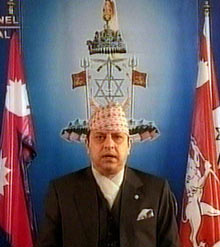Nepal's crisis deepened
Nepal's long-simmering crisis deepened after the latest rounds of pro-democracy protests against the king sparked violence, with mobs rampaging and a crackdown by security forces leaving three protesters dead.

The situation in Nepal appeared set to reach its most volatile point since King Gyanendra seized power more than a year ago with neither side showing willingness to back down.
Instead, the royal government warned of harsher measures, and its opponents vowed to keep bringing thousands of people into the streets to demand democracy be restored.
A crackdown by security forces in recent days left three protesters dead and more than 800 people in jail, and the government on Sunday again threatened more force could be used to restore order, saying Maoist rebels had infiltrated the protests and fired on security forces.
Nepal's political opposition and a separate, well-armed communist insurgency, meanwhile, vowed to indefinitely continue protests, even as a four-day nationwide strike ended Sunday.
The protests will be "long drawn. I can't say how this will end," said Ram Sharan Mahat of the country's largest party, the Nepali Congress, one of seven parties that have banded together to oppose Gyanendra. "The king must restore democracy," he said.
The latest death came in the town of Banepa, just east of Kathmandu, on Sunday when security forces fired on protesters hurling stones and shouting slogans, said an official who spoke on condition of anonymity because he was not authorized to talk to the media.
A day earlier, two demonstrators were shot and killed in separate incidents by security forces that were also being pelted with stones.
Saturday was the 16th anniversary of the introduction of democracy in Nepal, which came about after dozens of pro-democracy demonstrators were shot by police, prompting a surge of anti-royal sentiment and forcing the late king Birendra to yield much of his authority.
Gyanendra abruptly ended the democratic experiment last year when he reclaimed absolute power, arguing he needed to bring order to a chaotic and corrupt political scene and end a communist insurgency that has killed nearly 13,000 people in the past decade, reports CNN.
I.L.
Subscribe to Pravda.Ru Telegram channel, Facebook, RSS!




